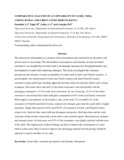Comparative Analysis Of Acceptability Of Camel Milk Among Rural And Urban Consumers In Kenya

View/
Date
2011Author
Emukule, J. I.
Ngigi, M.
Guliye, A.Y.
Lamuka, P.O.
Language
enMetadata
Show full item recordAbstract
The demand for information on consumer food consumption and satisfaction by the public and
private sector is increasing. The information on perceptions and attitudes of rural and urban
consumers’ on acceptability of camel milk is increasingly necessary for the popularization and
development of camel milk marketing strategies. This study investigated the consumer
perceptions and attitudes towards acceptability of camel milk in Isiolo and Nairobi counties. A
questionnaire was administered to both rural (Isiolo county) and urban Nairobi County)
consumers using multistage sampling approach and data analyzed using the Likert scale scoring
technique. The results show that 66% of the urban consumers were dissatisfied with the
packaging compared to 19.1% of the rural consumers. In case of pricing, 53.3% of the urban
consumers were dissatisfied camel milk price compared to 6.4% of the rural based consumers.
With respect to perceptions on the nutritive value of the milk, 73.1% and 91.5% of the
consumers in Nairobi and Isiolo County, respectively strongly agree that the camel milk is highly
nutritious. Eighty three percent (83%) and 94.9% of consumers in Isiolo and Nairobi County,
respectively, believed that camel milk has therapeutic properties. Both the urban and the rural
consumers believed that camel milk can be able to treat stomach upsets, blood pressure, diabetes
and stomach ulcers. In both areas over 97% of the consumers were highly satisfied with the taste
of the milk. The implications of these findings are that to enhance the consumption of camel
milk in urban areas, there is need to improve the packaging material and the pricing should be
adjusted to match with that of cow milk.
